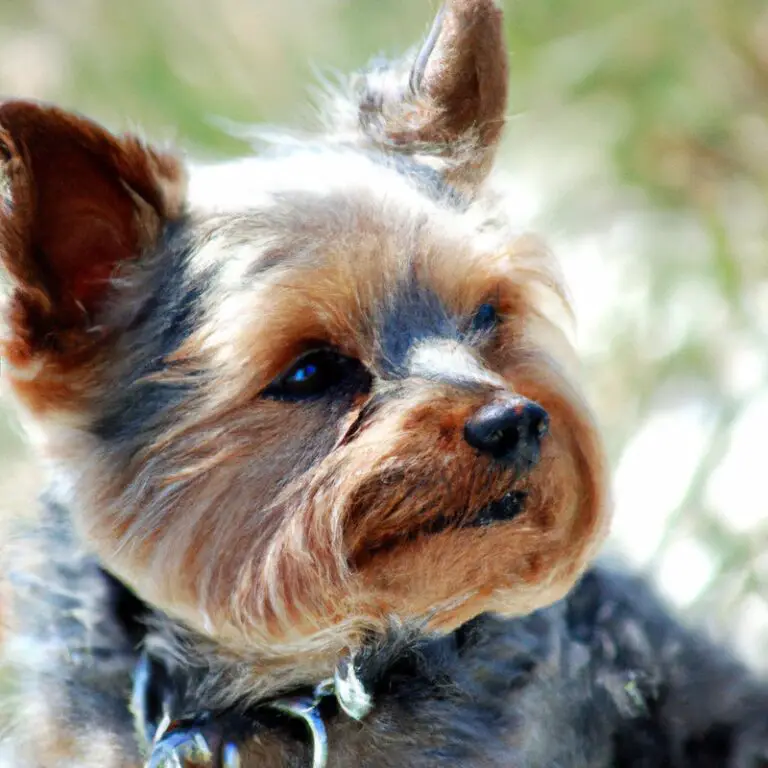What Are Some Common Yorkshire Terrier Behavior Problems?
Key Takeaways:
- Separation anxiety is a common behavior problem in Yorkshire Terriers.
- Yorkshire Terriers may exhibit aggression towards other dogs, often stemming from fear or territoriality.
- Housetraining can be a challenge for Yorkshire Terriers, requiring consistent training and positive reinforcement.
- Excessive barking is another behavior problem commonly found in Yorkshire Terriers, often due to their protective nature.
Have you ever experienced the joy of being a Yorkshire Terrier parent? If so, you know how these little bundles of energy can bring immense love and loyalty into your life.
But like any breed, Yorkshire Terriers can sometimes exhibit behavior problems that can be challenging to handle.
In this article, I’ll walk you through some of the common behavior issues that Yorkshire Terriers often face. From excessive barking to aggression towards other dogs, we’ll explore the reasons behind these problems and provide you with practical tips to manage and prevent them.
So, if you’re ready to learn how to tackle these common behaviors head-on, keep reading!
| Behavior Problem | Description |
| Anxiety | Yorkshire Terriers can be prone to anxiety, which may manifest as excessive barking, aggression, or destructive behaviors. |
| Separation Anxiety | Yorkshire Terriers are known to develop separation anxiety when left alone for long periods, leading to behaviors like excessive whining, crying, and destructive chewing. |
| Barking | It is common for Yorkshire Terriers to be quite vocal and bark frequently, especially when they are alarmed or want attention. |
| House Training Issues | Some Yorkshire Terriers may have difficulty with house training and may require consistent and patient training to overcome this problem. |
| Aggression | While not exclusive to Yorkshire Terriers, they can exhibit aggressive behaviors if not properly socialized or trained. This may include growling, snarling, or biting. |
| Chasing Behaviors | Yorkshire Terriers have a natural instinct to chase smaller animals, which may pose a challenge for owners in controlling their tendency to chase after squirrels, cats, or other small creatures. |
Understanding Yorkshire Terrier Behavior
The Energetic Nature of Yorkshire Terriers
Yorkshire Terriers are known for their lively and energetic nature. These little pups are bundles of energy and are always ready for action.
They love to play and run around, and can keep you on your toes.
With their high energy levels, Yorkshire Terriers require regular exercise to keep them happy and healthy. Taking them for daily walks, playing fetch, or engaging in interactive toys and games can help channel their energy in a positive way.
Make sure to provide them with ample opportunities to burn off their energy, as a lack of physical activity can lead to behavioral issues.
So, get ready for some fun and lively times with your Yorkshire Terrier!

The Loyalty and Protective Nature of Yorkshire Terriers
Yorkshire Terriers are known for their loyalty and protective nature. They form strong bonds with their owners and are always ready to defend them.
These little dogs may be small in size, but their protective instincts are mighty.
They will bark and alert you if they sense any potential threat or danger. Yorkies are also known to be fiercely loyal.
They will stand by their owners through thick and thin, offering comfort and companionship.
Their loyalty and protective nature make them great watchdogs and perfect additions to families looking for a small but devoted companion.

Yorkshire Terriers and Separation Anxiety
Yorkshire Terriers, like many other dog breeds, can experience separation anxiety when left alone. This is when they become anxious or distressed when their owners are not around.
Separation anxiety can manifest in various ways, such as excessive barking, destructive behavior, or even toileting indoors.
It’s important to understand that separation anxiety is not a result of your pet being disobedient or misbehaving. Instead, it stems from their strong attachment to their owners and their fear of being abandoned.
So, how can you help alleviate separation anxiety in your Yorkshire Terrier?
First and foremost, establish a routine. Dogs thrive on routine and consistency, so try to maintain a consistent schedule for feeding, exercise, and alone time.
This helps them feel secure and know what to expect.
Secondly, create a safe and comfortable environment for your Yorkshire Terrier. Provide them with a cozy space, like a crate or a designated area, where they can relax and feel secure when you’re not home.
Next, gradually increase the time that your Yorkshire Terrier is left alone.
Start with short periods and gradually extend the duration. This helps them build confidence and realize that being alone is not a cause for anxiety.
Another helpful tip is to leave your Yorkshire Terrier with interactive toys or treat-dispensing puzzles.
These can keep them mentally stimulated and help distract them from their anxiety. Lastly, consider seeking professional help if your Yorkshire Terrier’s separation anxiety persists or worsens.
A veterinarian or a professional dog trainer can provide you with guidance and tailored solutions to address this issue.

Common Yorkshire Terrier Behavior Problems
Excessive Barking in Yorkshire Terriers
Excessive barking in Yorkshire Terriers is a common behavior problem that many owners face. It can be quite frustrating, especially if you live in an apartment or have close neighbors.
Thankfully, there are ways to address this issue and help your Yorkshire Terrier become a quieter and happier companion.
First and foremost, it’s important to understand why your Yorkie is barking excessively. They may be trying to alert you of something, such as a stranger approaching or a noise they find threatening.
On the other hand, they could be barking out of boredom, anxiety, or even for attention.
To address this behavior, it’s crucial to identify the underlying cause. Is your Yorkie getting enough physical and mental exercise?
Are they feeling anxious or stressed?
Once you understand the root cause, you can take appropriate steps to address it. Here are a few tips to help reduce excessive barking in Yorkshire Terriers:
- Provide sufficient exercise: Make sure your Yorkie gets enough physical activity to burn off their excess energy. Regular walks, playtime, and interactive toys can help keep them engaged and tire them out.
- Address anxiety and stimulation needs: Yorkies are known for their intelligence, so it’s important to provide mental stimulation. Puzzle toys, training sessions, and socialization can help reduce anxiety and keep their minds occupied.
- Teach the “quiet” command: By incorporating training sessions, you can teach your Yorkie the “quiet” command. Reward them when they stop barking on command and gradually increase the distractions to reinforce this behavior.
- Ignore attention-seeking barking: If your Yorkie barks excessively for attention, avoid responding to their demands. Giving in to their barking will only reinforce the behavior. Instead, wait for them to calm down before rewarding them with attention.
Yorkshire Terriers and Aggression Towards Other Dogs
Yorkshire Terriers, or Yorkies for short, are lovely and adorable companions. However, like any other dog breed, they may display certain behavior problems, including aggression towards other dogs.
Some Yorkshire Terriers can be quite territorial and protective of their space and their human family.
One common issue that arises is leash reactivity. When a Yorkshire Terrier encounters another dog while on a leash, they may become defensive or aggressive.
This behavior is often rooted in fear or insecurity.
It is crucial to address this issue early on to prevent it from escalating. Another problem that may arise is resource guarding.
Yorkies may growl, snap, or even bite when they feel threatened or when another dog approaches their food, toys, or personal space.
This behavior should be addressed with training and proper socialization to prevent potential conflicts. To mitigate aggression towards other dogs, positive reinforcement training is key.
By incorporating early socialization and exposing your Yorkshire Terrier to different dogs and situations, you can help them develop appropriate behavior and reduce their tendency towards aggression.
Additionally, seeking guidance from a professional dog trainer or behaviorist can be incredibly helpful in addressing and managing this issue.
Yorkshire Terriers and Small Dog Syndrome
Yorkshire Terriers and Small Dog Syndrome Let’s talk about Yorkshire Terriers and something called Small Dog Syndrome. You may have heard this term before, but what exactly does it mean?
Well, Small Dog Syndrome refers to certain behavior problems that are commonly seen in small dog breeds like Yorkshire Terriers.
Now, don’t get me wrong, Yorkies are adorable and make fantastic companions. But sometimes, their small size can lead to some not-so-great behaviors if they’re not properly trained and socialized.
One common issue is excessive barking.
Yorkies can be quite vocal and may bark a lot, especially if they believe they’re the boss of the household. This is where Small Dog Syndrome comes into play.
When these little furballs aren’t given clear boundaries and rules, they may start to think they’re in charge and act accordingly, which includes barking excessively.
Another behavior problem associated with Small Dog Syndrome is possessiveness. Yorkies can become possessive of their toys, food, or even their humans.
This can lead to snapping, growling, or even biting if they feel threatened or their possessions are being taken away.
So, what can you do to tackle Small Dog Syndrome in Yorkshire Terriers? First and foremost, it’s important to establish yourself as the pack leader or the one in charge.
Consistent training and setting clear boundaries will help your Yorkie understand the rules and their place in the family hierarchy.
Socialization is also crucial. By exposing your Yorkie to different people, animals, and environments, you’ll help them become more confident and less prone to possessiveness or fear-based aggression.
Yorkshire Terrier Fearfulness and Timidity
Yorkshire Terrier Fearfulness and Timidity The Yorkshire Terrier is known for its spunky and confident nature, but sometimes these little dogs can exhibit fearfulness and timidity. It’s important to understand and address these behaviors to help your Yorkie feel more secure and confident.
One common cause of fearfulness in Yorkshire Terriers is lack of socialization during their early development.
If a Yorkie hasn’t been exposed to different people, animals, and environments, they may become fearful and anxious in new situations. Another factor that can contribute to fearfulness is traumatic experiences.
If a Yorkie has had a negative encounter, such as an attack by another dog, it can leave a lasting impact on their confidence.
To help your Yorkie overcome fearfulness and timidity, it’s important to provide positive experiences and gradual exposure to new things. Gradually introduce them to other dogs, people, and different environments, always in a controlled and safe manner.
Positive reinforcement, such as treats, praise, and rewards, can also help boost their confidence.
Yorkshire Terrier Housebreaking Issues
Yorkshire Terriers are known for their small size and adorable appearance, but like any other dog, they may have housebreaking issues. Housebreaking refers to the process of teaching a dog to go to the bathroom in appropriate areas.
First and foremost, consistency is key.
Establish a routine for taking your Yorkshire Terrier outside to relieve itself. Take it out first thing in the morning, after meals, and before bedtime.
Praise and reward your dog when it goes to the bathroom outside to reinforce good behavior.
Accidents may still happen, especially during the initial stages of housebreaking. Clean up accidents promptly and thoroughly to remove any lingering scent that may attract your dog to go in the same spot again.
Use an enzymatic cleaner specifically designed to eliminate odor.
If you catch your Yorkshire Terrier in the act of going to the bathroom indoors, interrupt it with a firm “no” and immediately take it outside. Again, praise and reward it when it finishes outside.
Patience is crucial in this process.
Housebreaking takes time and consistency.
Tips for Managing Yorkshire Terrier Behavior Problems
Training and Socialization for Yorkshire Terriers
Training and socialization are essential for Yorkshire Terriers to ensure they grow up to be well-behaved and confident dogs. First and foremost, start training your Yorkie as early as possible.
These little pups are intelligent and eager to please, making them quick learners.
Use positive reinforcement techniques, such as treats and praise, to motivate and reward good behavior. Consistency is key.
Set clear boundaries and rules, and be consistent in enforcing them.
This will help your Yorkie understand what is expected of them. Focus on basic commands like sit, stay, and come, and gradually progress to more advanced training as they master the basics.
Socialization is equally important.
Expose your Yorkie to different environments, people, and animals from a young age. This will help them develop the necessary social skills and prevent them from becoming fearful or aggressive.
Take them for regular walks, visit dog parks, and arrange playdates with other well-behaved dogs.
Effective Techniques to Reduce Excessive Barking
Excessive barking can be a frustrating behavior problem in Yorkshire Terriers. However, there are effective techniques to help reduce it.
Here are some methods that you can try:
- Identify the triggers: Pay attention to what sets off your Yorkie’s barking. Is it strangers, other pets, or certain noises? Understanding the triggers can help you address the underlying cause.
- Positive reinforcement: Use positive reinforcement techniques to reward your Yorkie for calm and quiet behavior. When they are not barking excessively, praise and treat them to reinforce the desired behavior.
- Distraction techniques: Provide your Yorkie with toys, puzzles, or activities that keep them mentally stimulated and distracted from barking excessively. This can help redirect their attention and reduce barking.
- Obedience training: Enroll your Yorkie in obedience training classes or work on commands at home. Teaching them basic commands such as “quiet” or “enough” can help them understand when it’s time to stop barking.
- Avoid punishment: Avoid yelling or punishing your Yorkie for barking excessively as it may worsen the behavior. Instead, focus on positive reinforcement and redirecting their attention.
Dealing with Yorkshire Terrier Aggression
Dealing with Yorkshire Terrier aggression can be challenging, but with the right approach, you can help address this behavior. First and foremost, it’s crucial to understand the underlying cause of the aggression.
Is your Yorkshire Terrier feeling threatened, protective, or anxious?
Identifying the root cause will help you tailor your approach. Next, consistency is key.
Establish clear boundaries and rules to let your Yorkshire Terrier know what behavior is acceptable and what is not.
Reward positive behavior with treats and praise, while correcting and redirecting any signs of aggression. Providing proper socialization opportunities is also important.
Gradually expose your Yorkshire Terrier to different people, animals, and environments in a controlled and positive way.
This will help reduce fear or aggression towards unfamiliar situations. Seeking professional help from a dog trainer or a behaviorist might also be beneficial.
They can provide guidance and create a customized training plan for your Yorkshire Terrier’s specific needs.
Correcting Small Dog Syndrome in Yorkshire Terriers
Correcting Small Dog Syndrome in Yorkshire Terriers Small Dog Syndrome is a behavior problem often found in Yorkshire Terriers and other small breeds. Essentially, it’s when these little pups believe they are the boss, ruling the roost and calling the shots.
To correct Small Dog Syndrome in Yorkshire Terriers, consistent training is key.
First and foremost, establish yourself as the pack leader. Set clear rules and boundaries and enforce them consistently.
Don’t let your Yorkshire Terrier intimidate you with their tiny size.
Another important step is socialization. Expose your Yorkshire Terrier to different people, animals, and environments from an early age.
This will help them develop confidence and prevent them from becoming excessively protective or possessive.
Additionally, be positive and rewarding in your training approach. Use treats, praise, and toys to reinforce good behavior.
Avoid harsh punishments or yelling, as this can make your Yorkshire Terrier more fearful or aggressive.
Lastly, remember to exercise your Yorkshire Terrier regularly. Physical activity helps release pent-up energy, reduces anxiety, and promotes balanced behavior.
By addressing Small Dog Syndrome through consistent training, socialization, positive reinforcement, and regular exercise, you can help your Yorkshire Terrier become a well-behaved and happy companion.
Helping Yorkshire Terriers with Fearfulness and Timidity
Helping Yorkshire Terriers with fearfulness and timidity is important for their overall well-being. So, how can you support your Yorkie if they are showing signs of fear or timidity?
First and foremost, create a safe and secure environment for your Yorkie.
Make sure they have a designated space where they feel comfortable and at ease. Provide them with a cozy bed, toys, and a quiet place to retreat to when they need some alone time.
Socialization is key for helping your Yorkie overcome fearfulness.
Gradually expose them to new people, animals, and environments in a controlled and positive manner. Start with short and positive interactions, and gradually increase the exposure over time.
This will help build their confidence and decrease their fear response.
Positive reinforcement training can also go a long way in helping your Yorkie with fear and timidity. Reward desired behaviors with treats, praise, and play.
This will help them associate positive experiences with new situations and build their confidence.
Housebreaking Tips for Yorkshire Terriers
Housebreaking your Yorkshire Terrier can be a bit challenging, but with consistency and patience, you can succeed. Here are some effective housebreaking tips for Yorkshire Terriers:
- Establish a routine: Establish a fixed schedule for feeding, walking, and potty breaks. This will help your Yorkshire Terrier understand when it’s time to go outside to relieve themselves.
- Use a crate: Crate training can be very helpful in housebreaking your Yorkshire Terrier. Dogs naturally avoid soiling their sleeping area, so having a crate that is just big enough for them to turn around and lie down will encourage them to hold it until they are taken outside.
- Be vigilant: Keep an eye on your Yorkshire Terrier at all times, especially during the initial stages of housebreaking. This way, you can quickly pick up on signs that they need to go outside, like sniffing or circling.
- Reward good behavior: When your Yorkshire Terrier eliminates outside, praise and reward them with treats or verbal praise. Positive reinforcement will help reinforce the idea that going outside is the desired behavior.
- Clean accidents properly: Accidents are bound to happen during the housebreaking process. It’s important to clean up accidents thoroughly with an enzymatic cleaner, as the scent of urine may encourage your Yorkshire Terrier to continue eliminating in that spot.
Seeking Professional Help for Yorkshire Terrier Behavior Problems
When to Consult a Professional Dog Trainer or Behaviorist
If you are facing difficulties with your Yorkshire Terrier’s behavior, it might be time to reach out to a professional dog trainer or behaviorist. A professional can provide expert guidance, support, and training techniques to help address your Yorkie’s behavior problems effectively.
If your Yorkie displays aggressive behavior, excessive barking, separation anxiety, or any other behavioral issue that is causing distress or is potentially dangerous, consulting a professional is recommended.
They have the knowledge and experience to assess the situation and develop a tailored plan to address the problem.
The Role of Medication in Managing Behavior Problems
Medication can play a helpful role in managing behavior problems in Yorkshire Terriers. It is important to note that medication should never be the first solution, but rather a tool used in combination with other behavioral interventions.
It can be particularly effective in cases where behavior problems are severe or not responding to other treatments.
Medication can help reduce anxiety, aggression, excessive barking, and other problematic behaviors. However, it is crucial to consult with a veterinarian who is experienced in behavioral medications to ensure the right prescription and dosage for your Yorkshire Terrier.
Choosing the Right Professional for Your Yorkshire Terrier
Choosing the right professional for your Yorkshire Terrier is important to address any behavior problems effectively. First and foremost, look for a professional who specializes in small dog breeds and has experience with Yorkshire Terriers specifically.
This ensures they have the knowledge and understanding of the breed’s unique characteristics and tendencies.
Ask for recommendations from trusted sources such as your veterinarian or fellow Yorkshire Terrier owners. You can also search online for professional dog trainers or behaviorists who have positive reviews and testimonials from clients.
When narrowing down your options, schedule interviews or consultations with potential professionals.
This gives you the opportunity to ask questions about their training methods, experience, and success rates. Trust your instincts and choose someone who you feel comfortable with and who communicates well with you.
Keep in mind that credentials and certifications can also be important factors to consider.
Look for professionals who have undergone proper training and education in animal behavior or dog training.
Preventing Yorkshire Terrier Behavior Problems
Early Socialization for Yorkshire Terriers
Early socialization is incredibly important for Yorkshire Terriers. It’s all about exposing them to different people, animals, and environments from a young age.
This helps them develop into well-rounded and confident adult dogs.
One way to do this is by introducing your Yorkie to a variety of people and animals in a positive and controlled manner. This can be done through puppy classes, playdates, and supervised interactions with other friendly dogs.
Additionally, taking your Yorkie for regular outings to different places can also help them become comfortable in new environments.
The key is to make these experiences positive and enjoyable for your pup. By providing early socialization, you can greatly reduce the chances of behavior problems in your Yorkshire Terrier later on.
Consistent and Positive Reinforcement Training
Consistent and positive reinforcement training is key when it comes to addressing Yorkshire Terrier behavior problems. First and foremost, consistency is essential in training your Yorkshire Terrier.
This means using the same commands, rules, and expectations every time.
Dogs thrive on routine, so sticking to a consistent training plan will help them understand what is expected of them. Positive reinforcement involves rewarding your Yorkshire Terrier for good behavior rather than punishing them for bad behavior.
This can include treats, praise, or playtime as a reward for following commands or exhibiting desirable behavior.
By focusing on rewarding the good, you create a positive association and motivation for your dog to repeat the behavior. It’s important to remember that training takes time and patience.
Be consistent in your approach, reward good behavior, and give clear and positive instructions.
With consistent and positive reinforcement, you can address common Yorkshire Terrier behavior problems effectively and build a strong bond with your furry friend.
Providing Mental and Physical Stimulation for Yorkshire Terriers
Providing mental and physical stimulation for Yorkshire Terriers is essential for their overall well-being. Here are some simple ways you can keep your Yorkie entertained and engaged:
- Interactive Toys: Invest in puzzle toys or treat-dispensing toys that can keep your Yorkie mentally stimulated. These toys challenge their problem-solving skills and provide hours of entertainment.
- Daily Walks: Yorkshire Terriers may be small, but they still require regular exercise. Take your Yorkie for daily walks to help burn off excess energy and keep them physically fit. It’s also a great opportunity for them to socialize with other dogs.
- Training Sessions: Yorkshire Terriers are intelligent dogs and enjoy learning new commands. Regular training sessions not only provide mental stimulation but also strengthen the bond between you and your dog. Teach them tricks, obedience commands, and engage in interactive games during training.
- Playdates: Arrange playdates with other friendly dogs to provide socialization opportunities for your Yorkshire Terrier. Socializing with other dogs can help prevent behavior problems and keep them mentally stimulated.
- Rotate Toys: Introduce new toys and rotate them regularly to prevent boredom. This will keep your Yorkie interested and engaged, as they will have a variety of toys to play with.
Proper Exercise and Energy Outlet for Yorkshire Terriers
Proper exercise and providing an outlet for their energy is vital for Yorkshire Terriers. These pint-sized pups may be small, but they have a lot of energy to burn! One of the best ways to keep them happy and well-behaved is by giving them regular exercise.
Yorkshire Terriers love going for walks, playing fetch, and participating in interactive play sessions.
It’s important to tailor their exercise routine to their size and age, making sure not to overexert them. By providing proper exercise and an outlet for their energy, you can help prevent behavior problems and keep your Yorkshire Terrier happy and healthy.
Final Verdict
Understanding Yorkshire Terrier behavior is crucial for owners to effectively manage and prevent common behavior problems. Yorkshire Terriers are energetic, loyal, and protective, but may also suffer from separation anxiety.
Excessive barking, aggression towards other dogs, small dog syndrome, fearfulness, and housebreaking issues are common problems faced by Yorkshire Terrier owners.
To manage these problems, training and socialization are key, along with techniques to reduce barking, address aggression, correct small dog syndrome, and help with fearfulness. Seeking professional help may be necessary in some cases, and preventive measures such as early socialization, consistent training, and providing mental and physical stimulation can help prevent behavior problems.
With the right approach, Yorkshire Terrier owners can establish a harmonious and fulfilling relationship with their furry companions.







